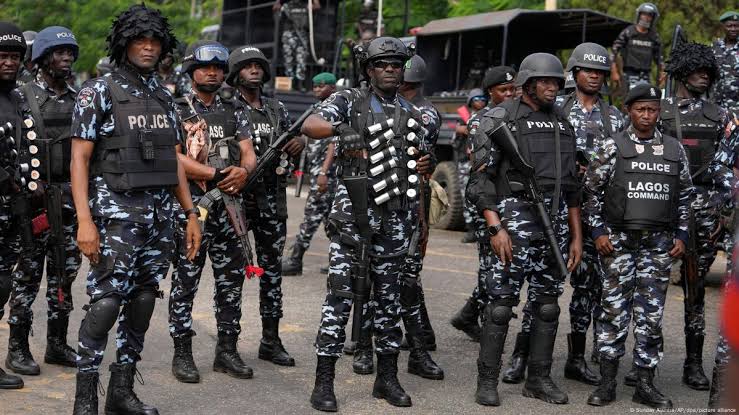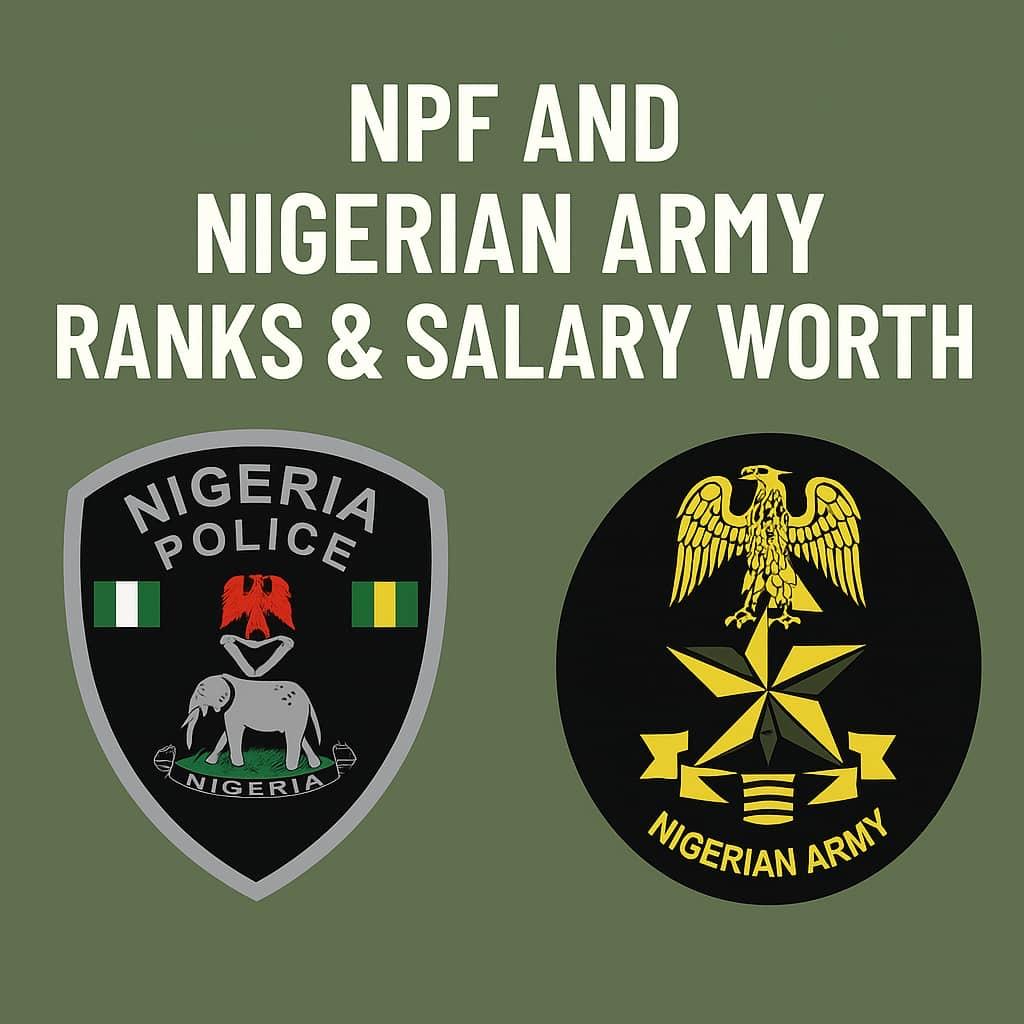Npf (Police) And Nigerian Army Ranks & Salary Structure In 2025: Fg-Approved Guide
With the recent increase in Nigeria’s minimum wage to ₦77,000, the federal government has reviewed the salaries of uniformed personnel across board. For two of the country’s biggest forces—the Nigeria Police Force (NPF) and the Nigerian Army—this has led to an upward review in take-home pay, especially at the junior levels.
Whether you’re hoping to join the force or just curious about how much these officers earn, this official guide for 2025shows the updated salary structure based on current ranks, now benchmarked on the new national wage standard.

Nigeria Police Force (NPF) Salary Structure – 2025
Rank-Based Monthly and Annual Salary
| Rank | Monthly Salary (₦) | Annual Salary (₦) |
| Inspector-General of Police (IGP) | ₦1,200,000 | ₦14,400,000 |
| Deputy Inspector-General (DIG) | ₦950,000 | ₦11,400,000 |
| Assistant Inspector-General (AIG) | ₦850,000 | ₦10,200,000 |
| Commissioner of Police (CP) | ₦700,000 | ₦8,400,000 |
| Deputy Commissioner (DCP) | ₦620,000 | ₦7,440,000 |
| Assistant Commissioner (ACP) | ₦520,000 | ₦6,240,000 |
| Chief Superintendent (CSP) | ₦460,000 | ₦5,520,000 |
| Superintendent (SP) | ₦430,000 | ₦5,160,000 |
| Deputy Superintendent (DSP) | ₦400,000 | ₦4,800,000 |
| Assistant Superintendent II (ASP II) | ₦370,000 | ₦4,440,000 |
| Assistant Superintendent I (ASP I) | ₦345,000 | ₦4,140,000 |
| Cadet Inspector | ₦300,000 | ₦3,600,000 |
| Sergeant Major | ₦200,000 | ₦2,400,000 |
| Sergeant | ₦170,000 | ₦2,040,000 |
| Corporal | ₦150,000 | ₦1,800,000 |
| Constable I | ₦130,000 | ₦1,560,000 |
| Constable II | ₦115,000 | ₦1,380,000 |
| Recruit | ₦77,000 | ₦924,000 |

Nigerian Army Salary Structure – 2025
Rank-Based Monthly Salary (Estimate)
| Rank | Monthly Salary (₦) | Annual Salary (₦) |
| General (COAS) | ₦2,000,000 | ₦24,000,000 |
| Lieutenant General | ₦1,700,000 | ₦20,400,000 |
| Major General | ₦1,200,000 | ₦14,400,000 |
| Brigadier General | ₦950,000 | ₦11,400,000 |
| Colonel | ₦800,000 | ₦9,600,000 |
| Lieutenant Colonel | ₦650,000 | ₦7,800,000 |
| Major | ₦500,000 | ₦6,000,000 |
| Captain | ₦400,000 | ₦4,800,000 |
| Lieutenant | ₦350,000 | ₦4,200,000 |
| Second Lieutenant | ₦300,000 | ₦3,600,000 |
| Master Warrant Officer | ₦250,000 | ₦3,000,000 |
| Warrant Officer | ₦220,000 | ₦2,640,000 |
| Staff Sergeant | ₦200,000 | ₦2,400,000 |
| Sergeant | ₦180,000 | ₦2,160,000 |
| Corporal | ₦160,000 | ₦1,920,000 |
| Lance Corporal | ₦140,000 | ₦1,680,000 |
| Private | ₦120,000 | ₦1,440,000 |
| Recruit | ₦77,000 | ₦924,000 |
Allowances for Police & Army Officers
In addition to basic salary, the following standard allowances apply depending on deployment, rank, and risk level:
-
Housing Allowance
-
Uniform & Kit Allowance
-
Risk Allowance (combat zones)
-
Training & Operation Bonus
-
Transport/Vehicle Maintenance
-
Medical Allowance
-
Special Duty or Intelligence Bonus
These benefits significantly improve total compensation, especially for officers in high-risk or remote assignments.
Frequently Asked Questions (FAQ)
Q1: What is the new minimum wage for Nigerian Police and Army officers in 2025?
As of 2025, the minimum wage is ₦77,000, which is now the base salary for new recruits in both forces.
Q2: Do Army officers earn more than Police officers?
Yes, senior military officers typically earn more due to command structures, risk, and warfare responsibilities.
Q3: Do cadets in NDA or Police College get paid?
Yes. Cadets in military or police training institutions earn stipends between ₦77,000 – ₦150,000 depending on their level.
Q4: How often are salaries reviewed?
Salary structures are reviewed during major economic reforms, wage reviews, or after minimum wage negotiations—like the recent 2025 update.
Q5: Are allowances taxable?
Some allowances are non-taxable, especially those classified as hardship or duty-specific bonuses.
Conclusion
The new ₦77,000 minimum wage in Nigeria has prompted necessary updates in the salary structures of both the NPF and Nigerian Army. Entry-level recruits now enjoy better base pay, while senior officers have also seen increments across the board. Coupled with allowances and incentives, these changes aim to improve motivation and welfare among security personnel.
If you're planning to join the police or military, this guide should give you a full picture of what to expect financially—and hopefully, inspire your next career step.



